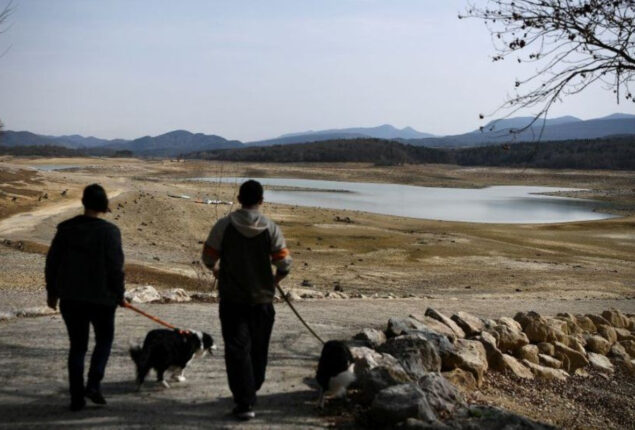French teacher killed by student who claimed to ‘be possessed’
A mentally unstable 16-year-old student killed a teacher at a school in...

France faces drought restrictions after driest winter
Having experienced its driest winter in more than 60 years, France is now subject to drought restrictions.
The nation is suddenly on alert after a month without any appreciable rainfall.
Local officials will gather on Monday to assess the situation “territory by territory”, Ecological Transition Minister Christophe Béchu has said.
According to the country’s weather service Météo-France, last year was the warmest year on record in France.
In other parts of Europe, including the UK, Spain, and Italy, records were broken.
Many places are still experiencing drought as a result of the scorching temperatures.
According to studies, snowfall in the Italian Alps is down by 53%, while water levels in the Po basin of Italy’s greatest river are 61% below average.
In response to the 2022 drought, a state of emergency was issued in five northern areas near the River Po last July.
Due to Venice’s low tides, the Grand Canal’s building foundations have become exposed and the city’s gondolas and water taxis are unable to navigate the muddy waterways.
The Alps, Europe’s most significant mountain range for supplying rivers, has seen a 5.6% decrease in snow cover length per decade during the previous 50 years, according to a paper released by Nature Climate Change last month.
Concerns have been raised about how to handle water emergencies, which scientists predict may happen more frequently as a result of climate change in light of the drought in Italy.
Legambiente, an Italian environmental organisation, has urged the government to adopt a national water policy.
Director Giorgio Zampetti noted that while 2023 has only just started, it is already exhibiting concerning trends in terms of drought levels and catastrophic weather occurrences.
In France, the ecological transition minister said that “soft” restrictions could be imposed after next Monday’s meeting with local leaders, to take effect in March to avoid “catastrophic conditions” during the summer months.
According to Météo-France, there was zero precipitation between 21 January and 21 February, with a cumulative total of less than 1mm for all of France.
A time period deemed essential for replenishing France’s groundwater reserves also saw much less snowfall in the Pyrenees and Alps than usual.
The next three months would be crucial, according to the agency, and rain was anticipated to return to southern France on Wednesday.
Catch all the World News, Breaking News Event and Latest News Updates on The BOL News
Download The BOL News App to get the Daily News Update & Follow us on Google News.